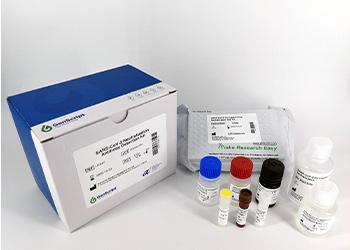
Test sees the antibodies that would grant immunity to COVID-19 – if it occurs
Researchers at the Duke-NUS Medical School in Singapore have announced a new blood test for neutralizing antibodies against SARS-CoV2, the virus that causes COVID-19, and have formed public and private partnerships to begin working toward making the tests clinically available.
The surrogate virus neutralization test or cPass™ differs from other commercially available kits because it allows rapid detection of neutralizing antibodies (NAbs) – the specific antibodies present in the serum of COVID-19 patients that are responsible for clearing the viral infection.
A feature of the test is that it can be administered without the need of live biological materials or a biocontainment facility. Normally, measuring NAbs requires the use of live virus, cells, highly skilled operators, and complex laboratory procedures that are generally less sensitive and require several days to obtain results.
Conventional virus neutralization tests require live coronaviruses and a biosafety level 3 lab for processing. This test is based on inactive genetic material called a pseudovirus and does not include any live biological materials.
Starting with a blood or serum sample from a patient, the test is very similar to a standard ELISA (enzyme-linked immunosorbent assay), that is used to scan blood for viruses, infections and even some kinds of cancer. The kit includes an ELISA plate pre-coated with the ACE2 cell receptor protein and a supply of receptor-binding or spike proteins of coronavirus bound to a color-changing molecule. If neutralizing antibodies are present in the patient’s sample, the RBD binding will be blocked, resulting in or reduced or no color.
The Diagnostics Development Hub at Singapore’s Agency for Science, Technology and Research (A*STAR), will be producing a pilot batch of the test kit for use in Singapore hospitals. They plan to share what they learn with local biotech companies for scaled-up production.
The new assay was validated with samples of 77 patients from PROTECT -- a multi-center Prospective Study to Detect Novel Pathogens and Characterise Emerging Infections -- which was coordinated by Singapore’s National Centre for Infectious Diseases. It was also tested against ferret and rabbit serum.
Preliminary study data appears in a pre-print manuscript that is currently under review for publication by NatureResearch. It shows that the test can discriminate between different types of SARS virus with achieving 100% specificity and 95-100% sensitivity.
Singapore officials said on Friday that the test is sensitive to all antibody isotypes and can be used to determine antibodies in different animal species without any modification, which could aid the development of SARS-CoV-2 vaccines and therapies.
The new test can be conducted within an hour in most research or clinical labs, and may also be adapted to high-throughput and fully automated testing. This test should be able to help in current COVID-19 investigations, from contact tracing to determining infection rates, herd immunity and predicted protection by T-cells in blood plasma.
The test was developed in the lab of Linfa Wang, who directs the emerging infectious diseases program at Duke-NUS Medical School.
“Our test can be used for contact-tracing, reservoir or intermediate animal tracking, assessment of herd immunity, longevity of protective immunity and efficacy of different vaccine candidates,” Wang said. “It does not require a biosafety containment facility, which makes it immediately accessible to the global community, including many developing nations.”
While it is still unknown whether the presence of SARS-CoV-2 antibodies confers immunity, it is important that this test looks specifically for the broadly neutralizing antibodies that would provide that immunity, the team’s pre-print publication said.
“This could be a game changer in the field of COVID-19 investigation,” said Professor Patrick Casey, Senior Vice Dean of Research at Duke-NUS, and James B. Duke Distinguished Professor of Pharmacology and Cancer Biology at the Duke University School of Medicine in Durham, NC.
GenScript Biotech Corporation, a global biotechnology company, conducted proof of concept research, product design and optimization, and will now play a central role in the commercialization process, using its global network and manufacturing capacity to launch cPass™ in Singapore and other regions around the world. The company has an exclusive license to the test but is interested in possible sublicense partners to increase capacity and market reach.
“The serological detection system developed by Professor Wang is unique, innovative, and has many advantages, such as high sensitivity and specificity, and applicability to all antibody isotypes,” said Dr. Li Zhu, Chief Strategy Officer of GenScript. “Detection of neutralizing antibodies determines who can more safely go back to work or to more social life. (This test) would be extremely useful for quick and reliable surveillance to determine how widely a population has gained immunity to SARS-CoV-2 virus.”
This article first appeared in Duke Today